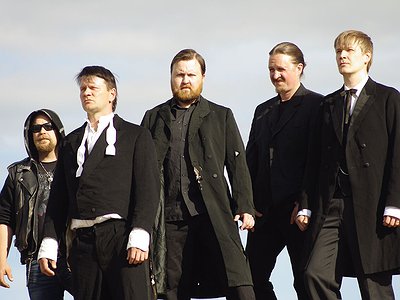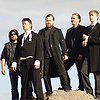Could you describe your creative process on the basis of a piece or album that's particularly dear to you, please? Where do ideas come from, what do you start with and how do you go about shaping these ideas?
[Jani] Let’s select “Closing Music” from our newest album Ordeal. My original goal was to create something new and different. At first I had an idea of creating an instrumental song and also a song without drums. I wanted to concentrate on the mood and write something very ultimate. I started writing riffs, especially something versatile which is nice to play with a guitar. I recorded my ideas with my iPad and after I had finished some parts, I played the ideas (not from iPad, but with my guitar) to other members. It was quite surprising. There was a huge change resistance. I was told that we can’t create a song without vocals or drums.
Then I started thinking about a compromise. How to write a song with drums in some untypical way? I discussed with our drummer and we started thinking of drum beats that are not typical “comping”. Offbeats and so on … Then how about the vocals? Something special was needed. Then I got an idea about dividing the song into two pieces. A very long outro (it turned out to be 6 minutes), fake ending, then continuum with massive organs and beautiful ending. I also got an idea about writing the song about my own funeral. Not a very nice topic but very emotional, though. This was also the base for the lyrics (that can be heard in the second part of the song) and helped me to find the correct mood for the song.
The song was especially arranged for our live recording session. It’s closing the concert. The atmosphere in the latter part of the song is extremely strong. The way how our vocalist Matti is yelling the lyrics sounds emotionally pretty painful. People in our concerts have been surprised when the song finally ends and they typically just stand quiet for 10-20 minutes. I’m happy with the final result, even it’s something quite different than I originally planned. That’s the richness when you’re arranging the songs with other people. The final outcome is always unpredictable in the beginning.
With more and more musicians creating than ever and more and more of these creations being released, what does this mean for you as an artist in terms of originality?
[Jani] Cheap technology and the Internet have completely changed the music business. However, the basic problem for an artist is still the same as always; you need to stand out from the other artists to be able to get a name, good concerts, recording contracts and such. Just today I read an interview with a manager in a Finnish mainstream record company. This person mentioned that their goal is to get people over 27 years old into the world of streaming music; Spotify etc. He also mentioned that it’s nowadays unnecessary to record and release a full album. It is better to record standalone songs, promote them and try to get as many clicks in a digital streaming media as possible. I’m not into such business. Maybe I’m a bit old fashioned person, but I prefer vinyl albums. Still, when it comes to literature, I’m nowadays reading more digital than manual books. I appreciate our current record label Svart Records as they are especially famous for releasing high-quality re-releases of great albums on vinyl.
How strictly do you separate improvising and composing?
[Jani] Quite loosely I would say. Often improvisations in a playing session provides great ideas for a composition work. On the other hand, I would always like to leave some room for improvisations in my compositions. That makes it possible invent exceptional ideas and create interesting nuances when you’re recording material in a studio. I’m now talking only about my own material. Probably it varies a lot depending on an artist or style of music.
How do you see the relationship between sound, space and composition and what are some of your strategies and approaches of working with them?
[Jani] Especially for the live concerts I find it very important that the music fills the room and certain frequencies can be felt in your body. I was once watching an orchestra playing Beethoven's 5th Symphony in a concert hall with poor acoustics. It sounded very weak, what a great disappointment!
It’s always nice when music contains some dramatics & dynamics. Silent parts that are slowly or suddenly getting stronger. Then you can feel how the music fills the space around you. I’m trying to establish the same in my composition work. I’m trying to utilise dynamics a lot in my work. We have organist (keyboards) who is using bass pedal in our band and our drummer is playing drums with mallets. With that setup it’s possible to create extremely strong sound walls, which is a nice tool for my composition work.
What's your perspective on the relationship between music and other forms of art – painting, video art and cinema, for example – and for you and your work, how does music relate to other senses than hearing alone?
[Jani] I’m a fan of contemporary arts. It’s very exciting when an artist has been able to combine different element, like sounds & video. In the beginning of the 18th century it was very typical in Finland that painters and composers worked in very close co-operation and created art together. Or at least they drunk a lot together … I’m not sure that happens anymore.
I’m trying to write music that is somewhat similar to movie soundtracks. I mean, a decent musical piece should contain some kind of drama and versatile atmospheres. Music can definitely feed your other senses as well. Especially how you’re emotionally feeling, but as well music could bring visual landscapes into your mind. Music is always a comprehensive experience.
I have used mental visualisation in some of my work. For example “The Everdarkgreen” tells about wandering in an ancient forest and a song called “The Arrival” describes how it feels when autumn is always followed by another autumn. Such visual ideas sometimes help me in the music writing process.
What's your view on the role and function of music as well as the (e.g. political/social/creative) tasks of artists today - and how do you try to meet these goals in your work?
[Jani] It’s quite an external topic for me. I have never tried to serve any serious topics with my music. Some well known artists have definitely power to influence people in some socially important topics. But as said, I’m not finding that essential in my work.
Listening is also an active, rather than just a passive process. How do you see the role of the listener in the musical communication process?
[Jani] People are often mourning for something that has happened in the past or stressing for something that might be happening in the future. Listening to music is one option to get rid of these thoughts and be present instead. Maybe the most important task for music is to affect the mood. At least that’s how it’s often used. If you consider parties, weddings, funerals or for example a person remembering his/her childhood summers while watching old pictures. The listener also has the freedom to select which kind of music he/she likes to currently consume. That's a rather powerful position.
Reaching audiences usually involves reaching out to the press and possibly working with a PR company. What's your perspective on the promo system? In which way do music journalism and PR companies change the way music is perceived by the public?
[Jani] In the past 20 years I & my band have been very lazy in promoting ourselves. Record labels have done most of the promotion for us. In addition, we’ve have been trying to answer to the most of the interview requests and we have created an Internet presence (e.g. website, facebook, youtube videos). We are playing a few concerts per year, mainly abroad. That’s pretty much it from our side. I think, a decent promoter agent or manager is worth the investment if you’re doing music for a living.
Definitely musical journalism has a great power to select the artists who are visible for everyone. It’s an important part of the business. Luckily there are also a lot of people willing to use their spare time and maintain music related websites, discussion forums and release printed ‘zines.
Do you have a musical vision that you haven't been able to realise for technical or financial reasons – or an idea of what music itself could be beyond its current form?
[Jani] I have had a hazy vision about combining live music and some theatrical act, but haven’t really planned that further yet. Some kind of a short movie might also serve the same purpose. So far the showstopper has been the lack of time and expertise. It would be very interesting to produce such a bigger production some day. Smaller ideas that are rather easy to do, but for some reason I haven’t done them yet; I would like to produce background video material for my band’s live shows and compose an intro song that will be played before the actual show starts. Probably these are something I will start working on this year (2016).
If you liked this interview with Skepticism, you can visit their website or facebook page for further information.



